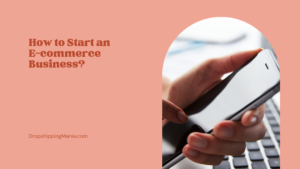E-commerce Business?
E-commerce Business is the buying and selling of goods or services via the internet, and the transfer of money and data to complete the sales. It’s also known as electronic commerce or internet commerce. Ecommerce one way among many that people buy and sell things in retail. Some companies sell products online only, but for many, ecommerce is a distribution channel that’s part of a broader strategy that includes physical stores and other revenue streams.

E-commerce Business
How to Start an E-commerce Business?
In this day and age, times are changing. More people are looking to be their own bosses and be in charge of their own futures. The internet makes this goal more accessible than ever, and ecommerce is one exciting avenue for success.
Although there are notable differences in starting an e-commerce business compared with starting a brick-and-mortar business — there are also a number of similarities. As we’ll discuss below, many of the planning and legal steps you’ll need to take will follow the same process (more or less) than any other business.

How to Start an E-commerce Business
1) Decide What Type of Business You Launch:
The possibilities are truly endless when you want to start an eCommerce business from scratch.
People sell all sorts of different things online and do it in all sorts of different niches and markets.
And what’s best about it all is that the numbers are only growing. It’s estimated that in 2022 there are 2.05 billion global digital buyers. Quite frankly, everyone and their dog is doing shopping online these days! [1]
But! This doesn’t mean you can wing it and not give a good thought about what you want to sell and who you want to sell it to.
To make your eCommerce business successful, you must set it up properly from the get-go.

1) Decide What Type of Business You Launch
2) Choose Logo and Name and Set Up Your Online Store:
Choose Store Name:
Finding an actual product to sell online, another challenging decision is determining your business or brand name and choosing an appropriate and available domain name. These blog posts will help you tackle these important tasks.
Choose Logo:
Once you’ve selected a memorable name and registered a corresponding domain, it’s time to craft a simple logo. In these resources, we’ll show you several options for creating a great logo for your new business.
- Hatchful: A simple logo maker by Shopify
- The Top 10 Paid and Free Logo Makers Online in 2023
- How to Design a Memorable Logo in 7 Steps (We Make One from Scratch)

2) Choose Logo and Name and Set Up Your Online Store
3) Promoting Your E-commerce Business:
After you’ve launched your store, concentrate on ecommerce marketing 110%. Anything else can wait until you’re sure you can generate traffic and reach potential customers.
You want to aim for that infinite loop where you spend less than you earn each day. Start by promoting your business on free marketing channels, then move onto paid channels once you’ve created some awareness.
A great ecommerce business plan does require some investment. Putting money into your advertising tactics should ultimately convert to sales, which you need.

3) Promoting Your E-commerce Business
4) Find Your Niche:
To succeed in your business, you need to carve out a niche. Choosing a niche helps you build credibility amongst one audience and dominate a particular corner of the market. When you niche, you become the go-to spot for a specific group of people.
There are some steps to find your niche:
- Evaluate your passion and skills
- Find a few different potential niches
- See if there is a market
- Narrow down your niche
- Validate your niche
- Test your niche

4) Find Your Niche
5) Pick the Right Product:
Choose items that inspire you and there’s likely someone out there who will love them just as much, too. Consider who your ideal customer would be and identify a need in your market.
It’s also a good idea of random items, like dog toys and wine glasses, unless they have an underlying theme that ties them together. This is a pretty big decision and a bit larger than what we can put into a single post, but the main point is still the same. Select things that you have a passion for and want to share with others.

5) Pick the Right Product
6) Researching Other Online Businesses:
Research is integral to the success of your ecommerce store. Once you have chosen your products, look at competitors and what they are doing. Competitor analysis can lead you to identify better products to sell and give you a great understanding of how to launch an online business.

6) Researching Other Online Businesses
7) Market Your Ecommerce Business:
There are a variety of marketing strategies you might decide to utilize — Google ads, social media ads, word of mouth, and more. At the most basic level, you’ll want to optimize your business website for SEO and take advantage of any online marketing tools that are included within your e-commerce platform.
If your e-commerce business starts to receive orders, you’ll want to keep track of which marketing tactics are working and which aren’t working. As time progresses, you’ll be able to adjust and change your marketing strategy to find what works best for your business.

7) Market Your Ecommerce Business
8) Invest in Multichannel selling:
There are benefits to selling through a larger outlet like Amazon, including the ability to test whether your product will be as popular as you predict, lower shipping rates if you frequently use Fulfillment by Amazon, and a built-in trust factor that often facilitates purchasing by customers on the Amazon marketplace. Although maintaining your own store and vision is paramount to starting an e-commerce business, you also shouldn’t rule out using larger platforms to help elevate your sales and brand name.

8) Invest in Multichannel selling
Is E-commerce a Profitable Business?
Yes, the ecommerce industry is profitable. Successfully starting an ecommerce company is a marathon, not a sprint. It can take 18 to 24 months for your business to get off the ground. It’s critical that you don’t measure the success of your business by your first-ear profitability.

Is E-commerce a Profitable Business
Is it Hard to Start Your Own E-commerce Business?
No, starting an ecommerce company is easy, with platforms like Shopify enabling brands to go online in just a few days. Starting a brand consists of hard work and continual market research to improve your business. We encourage you to read all our guides on how to start a business before you set up a store.

Is it Hard to Start Your Own E-commerce Business
Conclusion
Building your own ecommerce business is as exciting as it is challenging. At a rapid pace you’ll learn a ton about choosing a product, evaluating its viability, figuring out how to get it produced, building an ecommerce website, and marketing and selling to new customers. The process can feel like you’re solving a head scratcher of a puzzle, but it’s rewarding all the same.

Conclusion


